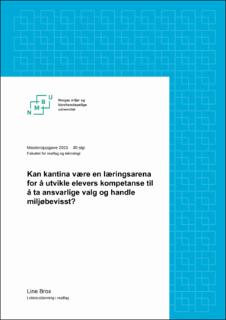| dc.contributor.advisor | Sinnes, Astrid Tonette | |
| dc.contributor.author | Line, Brox | |
| dc.coverage.spatial | Norway | en_US |
| dc.date.accessioned | 2022-02-07T11:54:10Z | |
| dc.date.available | 2022-02-07T11:54:10Z | |
| dc.date.issued | 2021 | |
| dc.identifier.uri | https://hdl.handle.net/11250/2977463 | |
| dc.description.abstract | I ny overordnet del av læreplanen ble temaet bærekraftig utvikling implementert som et av tre tverrfaglige temaer som skal gjennomsyre fagene i skolen. Gjennom formålsparagrafen og ny overordnet del er skolen forpliktet til å legge til rette for at elever skal kunne utvikle kompetanse i å ta etiske, miljøbevisste og ansvarlige valg. Da må elevenes handlingskompetanse utvikles. Dette er også et overordnet mål i Utdanning for bærekraftig utvikling (UBU). I denne studien søker jeg svar på forskningsspørsmålet: Hvilke muligheter og utfordringer kan det å integrere kantina i undervisningen gi mot å utvikle kompetanse hos elevene som gjør de i stand til å ta ansvarlige og miljøbevisste valg?
For å besvare forskningsspørsmålet ble det gjennomført en kvalitativ casestudie på en videregående skole på Østlandet. Skolen som undersøkes er i en planleggingsprosess av et prosjekt som handler om å endre driften i kantina i en mer bærekraftig retning gjennom veiledning fra den eksterne aktøren «Matvalget». Samtidig undersøker skoleeier, rektor og lærere hvordan skolen kan legge til rette for tverrfaglige prosjekter ved å ta i bruk kantina som læringsarena. Fem semi-strukturerte intervjuer med skoleeier, rektor, lærere, elever og representanter fra Matvalget ble gjennomført. Dette utgjorde det empiriske grunnlaget som ble analysert.
Resultatene fra studien indikerer at aktørene ser mange muligheter ved at å i bruk kantina i undervisningen. Disse er blant annet å øve elevers kritiske tenkning, fremme elevmedvirkning og synliggjøre endringer som fremmer bærekraft. Mat og bærekraft oppleves også som konkret og relevant. Forankring i skoleeiers politiske visjon er ansett som en fordel for enklere å gjennomføre prosjektet. Skoleeier, rektor og lærere påpeker likevel at en slik praktisk tilnærming er tidkrevende. Arbeidsmetodikken vil være avhengig av engasjement og kompetanse i alle ledd, noe som fordrer ildsjeler. Samtidig uttrykkes det en usikkerhet angående hvordan man kan jobbe for å utvikle elevers handlingskompetanse. Videre indikerer studien at det er visse aspekter som bør tillegges ytterligere fokus dersom målet med prosjektet er å utvikle kompetanse hos elevene som gjør de i stand til å ta ansvarlige og miljøbevisste. Disse er blant annet at elevene får mulighet til å utvikle visjoner om hvilken fremtid de ønsker å leve i og at de i større grad får mulighet til å utforske handlinger på et større strukturelt nivå. | en_US |
| dc.description.abstract | In the new overarching part of the curriculum, sustainable development was implemented as one of three interdisciplinary themes that will permeate the subjects in school. Through the Education Act and the new overarching part, the school is obliged to facilitate for the development of students’ competence to make ethical, environmentally conscious, and responsible choices. This is also an overarching goal in Education for Sustainable development (ESD). In this study, I attempt to answer the research question: What opportunities and challenges can be provided by integrating the canteen in the teaching towards developing students’ competence that enables them to make responsible and environmentally conscious choices?
To answer the research question, a qualitative case study was conducted at an upper secondary school in Eastern Norway. The school that is being investigated is in the process of planning a project about changing the canteen in a more sustainable direction through guidance from the external actor «Matvalget». At the same time, the school owner, principal, and teachers are investigating how the school can facilitate interdisciplinary projects by using the canteen as a learning arena. Five semi-structured interviews with the school owner, the principal, teachers, students and representatives from Matvalget were conducted. This formed the empirical basis that was analyzed.
The results from the study indicate that the actors see many possibilities with using the canteen as a learning arena. These include practicing students’ critical thinking, promoting student participation and make sustainability changes visible. Food and sustainability are also perceived as concrete and relevant. Anchoring in the school owner’s political vision is considered an advantage to make the project easier to implement. The school owner, principal and teachers nevertheless point out that such a practical approach is time-consuming. The approach will require commitment and competence at all levels. At the same time, uncertainty is expressed regarding how to work with developing students action competence. Furthermore, the study indicates that there are certain aspects that should be given additional focus if the goal of the project is to develop students’ competence in taking responsible and environmentally conscious actions. These include giving students the opportunity to develop visions of a preferable future and giving them a greater opportunity to explore actions on a structural level. | en_US |
| dc.language.iso | nob | en_US |
| dc.publisher | Norwegian University of Life Sciences, Ås | en_US |
| dc.rights | Attribution-NonCommercial-NoDerivatives 4.0 Internasjonal | * |
| dc.rights.uri | http://creativecommons.org/licenses/by-nc-nd/4.0/deed.no | * |
| dc.title | Kan kantina være en læringsarena for å utvikle elevers kompetanse til å ta ansvarlige valg og handle miljøbevisst? | en_US |
| dc.type | Master thesis | en_US |
| dc.description.localcode | M-LUN | en_US |

